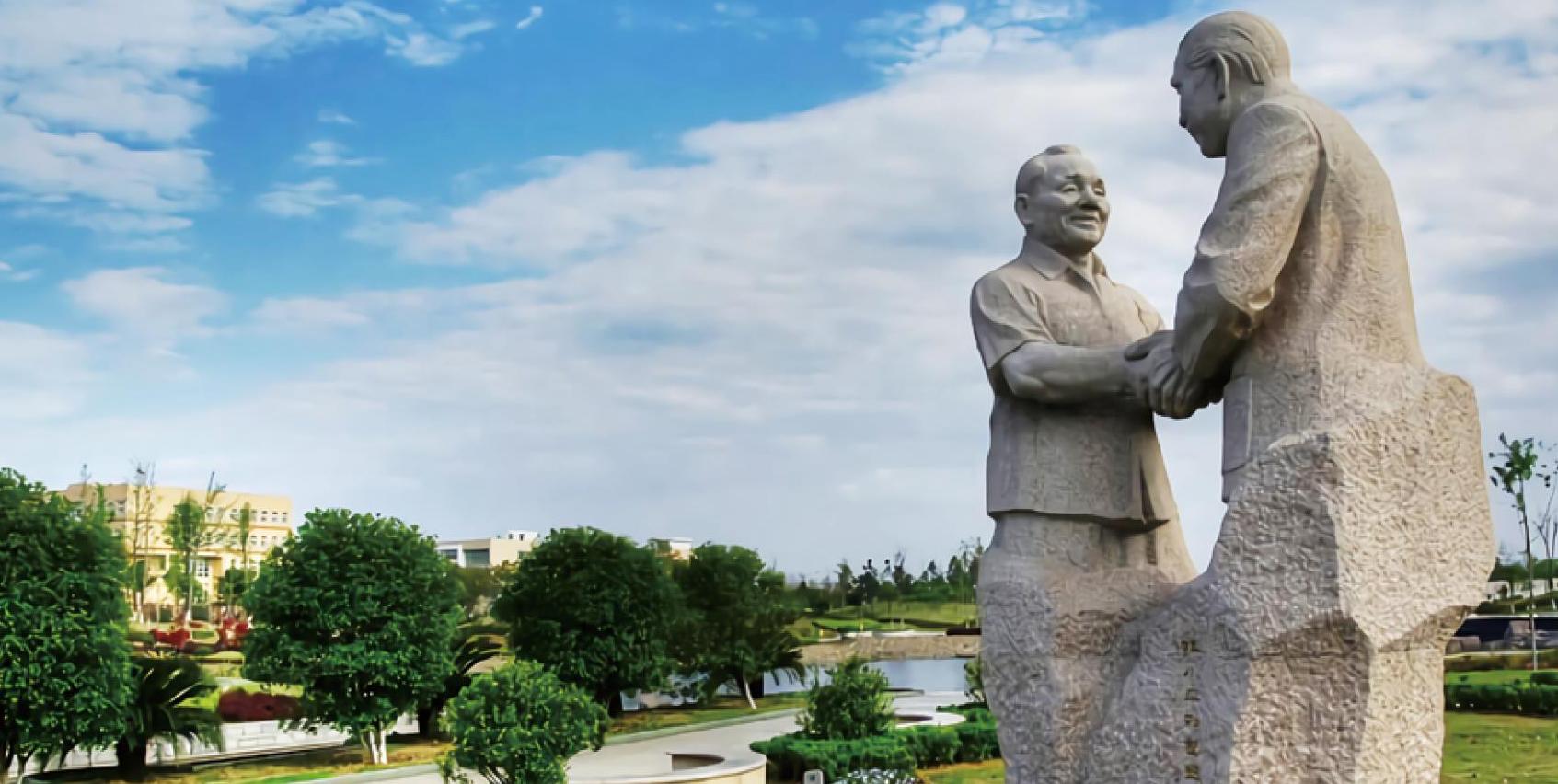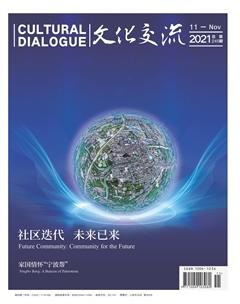历久不衰的“宁波帮”精神
十七房

邓小平同志在1984年作出指示:“把全世界的‘宁波帮’都动员起来,建设宁波。”这句话内涵深邃,意义重大,也可以作为提炼“宁波帮”精神的一个重要依据。
“宁波帮”为何能够历久不衰,生生不息?这种精神可以概括为8个字:诚信、務实、开放、创新。
诚信——“宁波帮”的优良传统
古人谈论诚信,侧重于己之“慎独”与待人之“信用”。诚是对自己,信是对别人。内心之诚发于外便是信;对自己能诚,对别人自然能信,两者相辅相成。而当西潮东卷、门户开放、中国社会开始由小农经济向市场经济急剧转型之际,作为“五口通商”口岸之一的宁波,人们又与时俱进,将诚信从传统社会的单纯道义转向近代社会道义和功利的双重推动,将诚信从农本社会的情感依据转向商业社会的理性依据,讲求诚信待人与诚信立业并重。
“宁波帮”商人早就意识到诚信的至关重要性,知道商业道德具有实际的利益基础,不但于人有利而且于己有益,所以他们视信誉重于效益,诚信是他们最为看重的品格。宁波钱庄业,正是由于良好的信用,被工商界誉为“信用码头”“多单码头”,称雄于金融界。又据潘子豪的《中国钱庄概要》称,晚清至民国的民间邮机构民信局,“为宁波之专业,资本甚大,信用亦佳,凡一经民信局保险之信札,内中银钱汇票,倘有遗失等情,一概由该局赔偿”。所以“民信局为宁波人独占”,业务遍及海内外。而西服业中的红帮裁缝,也始终以诚信作为立业之本,宁可拒绝十次,绝不食言一次,宁可赔本道歉,也绝不让一件次劣商品出门。即使在生活观念、行为方式越来越远离传统的当代国际社会中,许多宁波人仍然坚持诚信立业。世界船王包玉刚,无疑是当代“宁波帮”乃至全体宁波人的典范,他曾明确表示:“在商业道德这上头,还是老传统好。要有信誉,要有信用才行,这里面关系很大。”
现代市场经济本身,是立足于道德文化与契约文化的基础之上的。社会主义市场经济的诚信建设,是前无古人的事业,没有现成的模式。如何加强当代中国的诚信体系?答案应该是制度建设和教育引导双管齐下,他律与自律相结合,硬约束和软约束相统一。用于他律、硬约束的制度建设,重在建立健全的社会信用制度。而用于自律、软约束的教育引导,则显而易见,前文所述的诚信观念毫无疑问值得提倡,历史已经证明是行之有效的。
务实——“宁波帮”的精神品格
宁波人民具有讲求实效的风格。宁波人历来注重实效,崇尚多做少说,注重选择的所行性,目标进程中追求实效,折射出脚踏实地的人格定位。“宁波帮”实业家特别注重实干。他们不尚空谈,不坐而论道,崇尚埋头苦干、踏踏实实。无论是近代的叶澄衷、虞洽卿、方液仙,还是当代的包玉刚、陈廷骅、应昌期,都是一步一个脚印地埋头苦干而成为巨商。强烈的讲求实效意识使他们清醒地认识到,改善自己的处境最终还得靠自己实干,空喊口号无济于事。正是讲求实效的信念行为,使“宁波帮”商人较早地冲出封闭,不死守故土,利用滨海交通便利的优势向外域求得发展,在各地尽领风骚。尤其在上海更有影响,在助力近代上海经济的贸易、航运、金融业中独占鳌头。
能否带来实实在在的利益,能否切实地改善自己的生活,成为“宁波帮”商人取舍的重要依据。这一价值取向,使得他们在改革开放中的成就和贡献,同邓小平所倡导的“三个有利于”标准形成了高度契合。只要有实实在在的利益,“宁波帮”商人可以忍辱负重,干别人不愿干的“贱业”;可以背井离乡,风餐露宿,四海为家。“宁波帮”商人重视学习别人的先进经验,但并不盲从;对于自己选择的经实践证明确实符合本地实际、能带来实效的发展路子,他们会毫不动摇地走自己的路。这种着眼于实效的选择,使宁波在经济社会发展过程中,避免了盲从他人的一窝蜂现象,形成了符合宁波实际的发展模式。针对吸引外资是姓“资”姓“社”的争论,他们不予理会,只要有利可图,就扎扎实实地干下去,在对外开放中,突出吸引外资这个重点,形成多层次、全方位利用外资的格局,吸引外资始终位居全省首位。只要能带来效益,国有企业可以大胆借鉴民营企业的某些管理模式;反过来,民营企业同样积极移植国有企业重视思想政治工作的传统。
务实又铸就了宁波人办事低调、不事张扬的品格。这是宁波人求生存图发展的一种思维选择。在不同的历史时代都有不同的行为反映。近代的“宁波帮”商人办事低调。严信厚、叶澄衷、项松茂、方液仙等人在取得成就后,都从不张扬。面对成就,不妄自尊大,不断超越自我,一个目标接着一个目标,踏踏实实干下去。
开放——“宁波帮”的宽阔胸襟
对“宁波帮”而言,“开放”具有特定的内涵,即对外开放,博纳兼容,具有大海般的胸襟,这不但是历史上的宁波人努力在做的,也昭示了当代“宁波帮”的精神追求与必备的精神境界。对外开放,就是在经济上特别是商贸上向市外、省外乃至海外开放,接轨世界市场,融入全球经济一体化发展进程;在文化上也要“走出去、请进来”。博纳兼容,就是要摒弃狭隘的小市民心态,具备海纳百川般的文化性格,虚怀若谷,博采众长,善于借“他山之石”,乐于接纳“八面来风”,为我所用。此外,对于“宁波帮”而言,“开放”还具有多方面的意蕴与价值。
开放,是宁波商帮走天下的不懈追求。从古到今,宁波商人的足迹遍及五湖四海,积极参与国际性贸易。古代的“宁波帮”———“明州商帮”早就敢于北上日本、高丽,南下东南亚、阿拉伯海,驰骋国际商贸舞台;近代“宁波帮”敢于参与激烈的海内外商贸竞争,他们中的一些人善于学习并掌握西洋人的先进经营管理技能,造就了香港、上海、天津等城市的许多产业“亮点”;现代“宁波帮”则更善于走南闯北、开拓新领域,创造了许多奇迹。除了向外开拓、开放,宁波商人还善于向内开放,向内地开放宁波口岸,让各地借“宁波之船”出海闯世界。
孙中山先生1916年视察宁波时说:“宁波人对于工商业之经营,经验丰富,凡吾国各埠,莫不有甬人事业,即欧洲各国,亦多甬人足迹,其能力与影响之大,固可首屈一指也。”他还认为“宁波风气之开在各省之先”,称赞了宁波人的开拓性、开放性。当代宁波人在努力落实邓小平关于“把全世界的‘宁波帮’都动员起来,建设宁波”伟大号召的同时,提出欢迎“帮宁波人士”也来建设宁波,也同样体现了一种开放性思路。
創新——“宁波帮”的力量源泉
“宁波帮”创新精神的灵魂深藏在“敢为天下先”的文化心态之中,并成为“宁波帮”商人勇往直前的内在驱动力。这种创新精神早在浙东文化的学术思辨中就能找到强烈的印证。明代的王阳明敢于在禁锢人们精神的“理学”一统天下的思想格局内,公然倡导“致良知”学说,鼓动人们冲破既定的思想牢笼,去争取自我心灵的解放,在中国思想文化的发展史上掀开了光辉的篇章。黄宗羲以振聋发聩的声音,提出了前所未有的社会改革与民主启蒙的进步观念,历史性地突破了儒家理论的传统框架,让百姓在黑暗的封建年代里看到未来社会的曙光。这种创新精神在近、现代的宁波商帮的发展史上,也不难找见。宁波人朱葆三、虞洽卿等破天荒地筹建起新型航运公司,并于20世纪30年代率先成为国内最大的民营航运企业。其他如宁波商人叶澄衷,人称“五金大王”。还有“火柴大王”“肥皂大王”等宁波商人抱着“敢为天下先”的观念,纷纷成为各自行业的“巨子”与“领头羊”。而自改革开放以来,宁波人在社会发展与经济建设中勇当“弄潮儿”,在资源缺乏、能源不足的客观条件下,已获得年人均GDP超20000美元的发展水平,不能不让人深感“敢为天下先”的创新精神在其中所起的巨大作用。
“宁波帮”创新精神的思想基础建立在“敢创业、不守摊”的理念之上。这在“宁波帮”创业的思想与经历中十分普遍。还是在20世纪初期,不少宁波商人就充分利用积累的资金去创办新兴实业。宁波商帮的一些重要代表人物起先多在家乡小打小闹,而一旦时机成熟他们就走出宁波,到上海及其他大城市寻求新的创业机遇。他们敢冒风险、善于经营,思想不保守,行为不守摊。像早年当过普通职员、最终成为工商巨头的虞洽卿,就把事业的重心推向上海,并获得巨大成功。宁波商帮叶澄衷当年在上海的火柴业已很有地位,但他还是联合其他商人在汉口创办起一家规模空前的火柴企业,使自己的事业更上一个台阶。又如武汉的机电业、上海的五金业、天津的制衣业、东北的开垦业等有影响的实业,几乎都是闯荡天下、敢于创业的宁波工商者所开其先河。这种敬业、创业精神在新的历史条件下继续发生着作用与影响。当代宁波人坚持“敢创业、不守摊”的理念,宁波的众多企业如塑料业、电器业、机械制造业、文具业、模具业以及“雅戈尔”“杉杉”等已走出宁波,在全国许多重要城市的经济活动中塑造着他们非同一般的出色形象,甚至在世界各地也拥有一定的市场地位,这也是“敢创业、不守摊”创新精神最有力的见证。
“宁波帮”创新精神还涌动着一股“求发展”的思想活力。应当说上述“敢创业、不守摊”也是一种“求发展”的重要表现,然而“宁波帮”创新精神中的“求发展”还更多地反映于深层次的精神追求之上。在明、清时期,宁波之所以能出现诸如王阳明、黄宗羲这样一流的思想大家,根本的原因是当时的社会生活已出现商品经济的萌芽,因而在思想文化领域内产生与之相适应的进步思潮,这种“求发展”的时代意识促成了“浙东学派”带有原创精神的学术观念,也给近、现代宁波商帮的巨大成功提供了不可或缺的精神支柱。
当下,为什么要传承“宁波帮”精神?我们或许能从习近平总书记的这段话中找到答案:“我们全面深化改革,就要激发市场蕴藏的活力。市场活力来自于人,特别是来自于企业家,来自于企业家精神。”
三江口终将见证,拥有丰富精神财富的新一代“宁波帮”,将以更开阔的视野、更先进的理念,与城市共同书写高质量发展的新篇章。
(宁波市镇海区委宣传部为本栏目提供支持)
The Everlasting Spirit of Ningbo Bang
By Shiqifang
“Members of Ningbo Bang all over the world should be rallied to develop Ningbo,” stated China’s late leader Deng Xiaoping in 1984.
Here, Ningbo Bang, known alternatively as the Ningbo Merchants Group, the Ningbo Commercial Group or simply the Ningbo Group, refers to a loose community of traders, merchants and businessmen (as well as their offspring) operating outside their native place in Ningbo throughout history and in modern times. Emerging during the Ming (1368-1644) dynasty and one of the biggest regional commercial groups in China during the late Qing (1616-1911) period, Ningbo Bangcurrently is numbered at hundreds of thousands.
What’s the secret behind the enduring vitality of Ningbo Bang? It is down to the group’s distinctive traits: integrity, pragmaticism, openness and innovativeness.
Ningbo Bang has been widely known for their integrity, and businessmen of the group have long been aware of the vital importance of good faith in business. Business ethics, as they well know, benefits not only the clients but also for themselves. Therefore, they value good faith over short-term interest. For instance, Ningbo’s qianzhuang (money shops or old-style banks) industry, is lauded as the “bastion of integrity”. According to A General History of Qianzhuang in China (Zhongguo Qianzhuang Gaiyao) by Pan Zihao, private postal and banking business during the late Qing and the Republican period, “was Ningbo’s exclusive, with large capitals and excellent credit; once insured by these organizations, any loss of deposit or money orders will be fully compensated”; indeed, such businesses were popular both at home and abroad. The hongbang (red band) tailors in Ningbo — so called because many were serving foreigners who were usually referred to as “redhaired people” — would rather decline an order than break a promise, and would rather lose money than allow an inferior product to go to the customers. Bao Yugang (1918-1991), aka Yue-Kong Pao, a shipping magnate, is undoubtedly a paragon of Ningbo Bang in the contemporary era. “In business ethics,” he once made it very clear, “we need to follow the old traditions. You should be trustworthy and credible.”
Pragmatism has been part of makeup of Ningbo people, who advocate doing rather than empty talking. Whether it can bring real benefits and improve their lives has become an important basis for Ningbo businessmen. And Ningbo Bang members are no exception. Ye Chengzhong (1840-1899), Fang Yexian (1893-1940) and Bao Yugang are just a few who worked step by step to their successes.
In fact, it is this pragmatic attitude that helped them make a difference in China’s “Reform and Opening-up”. As long as there are tangible interests, Ningbo businessmen can do anything that others are unwilling to take on: leaving home, living in the cold and staying any place that suits them. Ningbo Bang businessmen attach importance to learning advanced experience from others, while not blindly following any fashion or crowd. State-owned enterprises readily absorb the best practices from private enterprises, and vice versa.
Being pragmatic has also made Ningbo people a humble lot. In the face of achievements, they are never arrogant; one goal after another, they continue to surpass themselves, solid and steadfast.
A perennial pursuit of Ningbo Bang is openness. Over generations, Ningbo traders and merchants have travelled around the world for international trade. The historical Ningbo Bang — known as Mingzhou Shangbang or Mingzhou (the ancient name of Ningbo) Merchants Group — had long journeyed to Japan and Korea in the north, Southeast Asia and the Arabian Sea in the south, galloping on the international business stage. In modern times, Ningbo Bang engaged in fierce competition, especially with their Western counterparts, at home and abroad. Excelled at mastering advanced management skills from the West, they helped propel many national industries to the top in Hong Kong, Shanghai, Tianjin and other cities. The contemporary Ningbo Bang has gone a step further, opening up new fields and creating miracles in China and across the globe.
Visiting Ningbo in 1916, Sun Yat-sen (1866-1925) commented, “Ningbo people have rich experience in industrial and commercial management. In every port in our country, and even in Europe, there are businesses run by Ningbo people, whose capabilities and influence are second to none,” before heaping praise on Ningbo people’s pioneering spirit and openness. Answering Deng Xiaoping’s call, Ningbo people are working hard to develop the city, and now they are embracing anyone who is willing to join the cause.
Ultimately, the pioneering spirit of Ningbo Bang comes from its innovativeness, the driving force for these businessmen. This innovativeness in turn can be discovered in the philosophical thinking of the Zhedong (Eastern Zhejiang) School, when the Neo-Confucian master Wang Yangming (1472-1529) broke away from the dominant School of Principle (Li) during the Ming dynasty and publicly championed the idea of innate moral knowledge and when Huang Zongxi (1610-1695) called openly for radical social reforms and enlightened democracy in the early Qing period. Since China started its “Reform and Opening-up”, Ningbo people have been striving to “surf the waves” in social and economic development. Per capita GDP in Ningbo has surpassed USD 20,000 despite a lack of natural resources.
This innovativeness has translated into the rapid development of Ningbo Bang, as businessmen from Ningbo constantly seek development, and, unfazed by the risks of starting businesses and not content with the status quo, they never sit on what they have achieved or accumulated.
Why is there still the need to pass on the spirit of Ningbo Bang? The answer may be found in the words of the General Secretary of the Communist Party of China Xi Jinping, “To comprehensively deepen reform, we need to stimulate market vitality. Market vitality comes from the people, especially from business leaders and their entrepreneurship.”
Sanjiangkou, where the Lancang River, Yaojiang River and Fenghua River meet and where the heart of Ningbo lies, will bear witness to the new generations of Ningbo Bang, who, empowered by broader visions and more advanced ideas, will write a new chapter of high-quality development together with the city.

